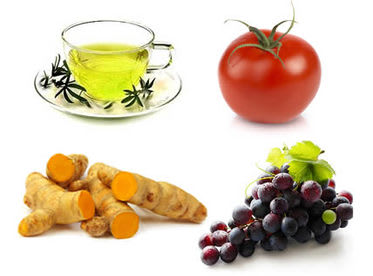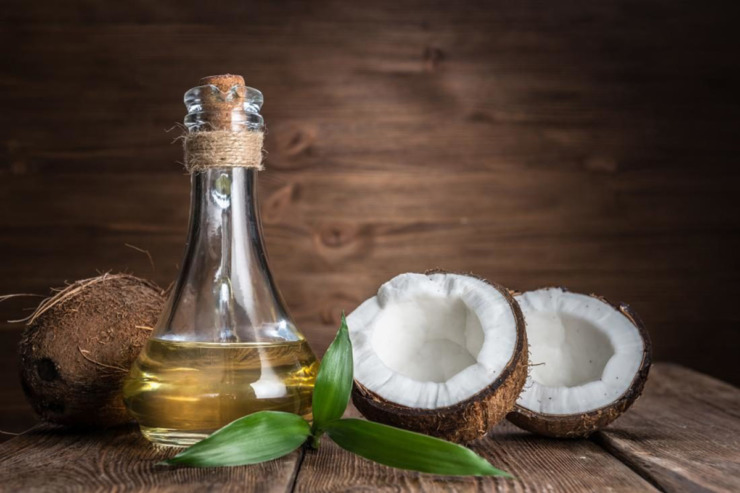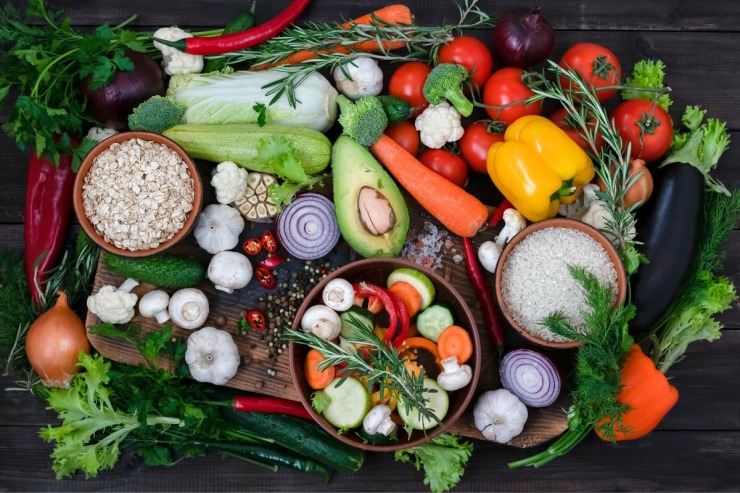
Here are 10 functional foods that suppress the growth of tumors while monitoring the human body’s immune system.
Scientists have found that healthy cells damaged by chemotherapy have more of a protein secreted by chemotherapy that boosts the survival of cancer cells. Chemotherapy has been shown to cause cancer in cells and interacts with nearby cancer cells to cause them to grow, invade, and most importantly, resist subsequent treatment. When conventional medical treatment fails in cancer patients, natural foods can succeed.
In a study published in the journal Science Translational Medicine, scientists identified a molecule known as TIC10, which activates a protein that helps fight the disease. The protein, called TRAIL (tumor necrosis factor-associated linkage-inducing apoptosis) suppresses tumor growth and can actually cross the blood-brain barrier, which separates the main circulatory system from the brain. Through this infinite wisdom of the body, its systems recognize foreign invaders and poisons such as chemotherapy, which are not beneficial to the brain. Many cancer drugs therefore block by crossing the blood-brain barrier. However, TRAIL is allowed passage due to its beneficial effects on the immune system. Another positive is that TIC10 not only activates the TRAIL gene in cancer cells, but also in healthy cells. This is known as the ‘proximity effect’ – that is, where cells close to cancer cells are also killed.
Nearby healthy cells are also given a boost to increase the number of cancer-destroying TRAIL receptors on their surface.
10 Functional Foods That Suspend BULK
1. Turmeric – Find the root here:
Curcumin , perhaps the most powerful antioxidant known from the popular Indian spice turmeric, has countless health benefits. A recent study led by a research team in Munich showed that it can also inhibit the formation of metastases. Curcumin exerts anti-inflammatory and anti-oxidant effects by inhibiting tumour necrosis factor-alpha (TNF-alpha), suggesting that its effect on endothelial function may be caused by suppression of inflammation and/or oxidative stress through down-regulation of TNF-α. One of the most comprehensive summaries of the review of 700 turmeric studies to date was released by respected ethnobotanist James A. Duke, PhD. It has shown that turmeric appears to outperform many pharmaceuticals in its effects against several chronic, debilitating diseases, and does so with almost no side effects.
2. Vegetables of the Sea
Nori , hijiki, wakame, arame, kombu and seaweed are just a few of several varieties of sea vegetables with potent cancer effects. It is a rich source of many with wonderful minerals including magnesium, calcium, iron and iodine.
However, since chronic, unwanted inflammation and chronic oxidative stress are two risk factors for cancer development, it will be very natural for scientists to be interested in sea vegetables which are anti-cancer foods not only in the case of colorectal cancer, but also for other types of cancer. Sea vegetables are well documented to contain a variety of anti-inflammatory and antioxidant compounds, and this combination of nutrients confers some risk reduction benefits in the case of colon cancer and other types of cancer.
Of special note in this area of cancer and sea vegetables is the issue of estrogen-related cancers, particularly breast cancer. Intake of sea vegetables seems to be able to modify the various aspects of a woman’s normal menstrual cycle in such a way that over long periods of time (tens of years), the total cumulative estrogen secretion that occurs during the follicular phase of the cycle gets reduced.
3. Grapes and resveratrol
Resveratrol is a phenolic compound that contributes to the antioxidant potential of red grapes. Resveratrol is not only an antioxidant and antimutagen, but also reduces cell death caused by oxidation. Resveratrol has been shown to inhibit nitric oxide production and tumor necrosis factor-alpha (TNF-A) production by lipopolysaccharide-stimulated Kuppfer cells. Kuppfer cells are macrophages fixed in place in the liver. Chronic overproduction of nitric oxide and TNF-A is due to chronic infection that can cause severe liver damage. Perhaps the most important property of resveratrol is its ability to inhibit cyclooxygenase-2 (COX-2). Cox-2 associated with cancers and abnormal growth in the intestinal tract. Natural COX-2 inhibitors such as resveratrol have been shown to reduce the occurrence of cancers and pre-cancerous neoplasms. So while pharmaceutical companies are racing to find agents that inhibit COX-2, the ingredient is already present in red grapes, which when consumed daily (or through organic grape juices) will protect against tumors naturally.
4. Chlorella and spirulina – Find them both here:
Scientists in South Korea recently found that carotenoids from Chlorella can be used effectively to prevent cancer in humans. They discovered the primary carotenoid from C. ellipsoidea is biolaxanthin, while the primary carotenoid from C. vulgaris is lutein. They tested the activity of semi-purified extracts of these carotenoids against human cancer and found that it inhibited cancer cell growth in a dose-dependent manner. Chlorophyll neutralizes environmental toxins and pollutants. It helps oxygen in the blood to all cells and tissues. Cancer cannot thrive in cells that are fully oxygenated. Chlorophyll plays a role in chlorella’s ability to detoxify heavy metals , and is a natural healer of wounds. There is evidence that chlorophyll reduces the ability of carcinogens to bind to DNA in major organs.Its anti-mutagenic properties make it protective against toxins such as pharmaceuticals.Spirulina is simply not able to remove heavy metals like Chlorella which does because it lacks a cell membrane, however it exhibits significant strengthening properties, it consists of a spiral strand which gives it its name. Spirulina is rich in vitamins B, E, K and beta carotene, as well as iron and magnesium and essential fatty acids. It contains amino acids that promote improved mental function, vitality and energy, and balanced blood sugar. According to a study done in China, selenium-infused spirulina inhibits the growth of breast cancer cells.
5. Green Tea – Detox here:
The health benefits of green tea are due to the presence of a group in the plant of flavonoids called catechins. Of particular interest to researchers is epigallocatechin-3-O-gallate (EGCG), the main catechin in green tea. For example, South Korean researchers have found that EGCG inhibits TNF naturally by interfering with the ability of certain pro-inflammatory chemicals to bind to smooth muscle cells of the vascular system. In a 2009 study conducted by the Chonbuk National University School of Medicine, it was noted that the specific mechanism of action of EGCG in terms of TNF inhibition is the suppression of fractalkine, an inflammatory factor specifically involved in the development of atherosclerosis or hardening of the arteries.
6. The cruciferous vegetables
Cruciferous vegetables contain vitamins, minerals, and other nutrients, and the chemicals known as glucosinolates. These chemicals are broken down into various biologically active compounds that are known to have anti-cancer effects. Rocket, broccoli, cabbage, cauliflower , cabbage, turnips and kale are some of the many different types of cruciferous vegetables that are rich in nutrients, including several carotenoids (beta-carotene, lutein, zeaxanthin), vitamins C, E, and K, folate and minerals.
Biologically active compounds such as indoles, nitriles, thiocyanates and isothiocyanates in these vegetables in cancer prevention, protect cells from DNA damage, assist and inactivate carcinogens, and induce cell death of carcinogens and inhibit the formation of tumor blood vessels (angiogenesis) and the migration of tumor cells (required for metastasis). For total glucosinolate content, turnips outscore cabbage, curly cabbage, cauliflower and broccoli among the most commonly eaten cruciferous vegetables.
7. Tomatoes
Regular consumption of tomatoes and their products consistently is associated with a lower risk of various types of cancer and, to a lesser extent, coronary heart disease. Among the many ingredients the tomato is credited with healthy properties, carotenoids and especially lycopene are being actively investigated. Moderate effects of regular intake of a tomato juice provides small amounts of carotenoids found to produce inflammatory mediators such as TNF-alpha. TNF-alpha production from whole blood was found to be more than 30% lower after almost a month of consuming raw tomato juice.
8. Medicinal Mushrooms –
Mushrooms have been used for at least 5,000 years for nutritional and medicinal purposes. Anti-viral and anti-cancer effect is demonstrated in more than 50 animal species and through in vitro studies. Six of these constituents in mushrooms have been investigated for their activity on human cancers: the lentinan component of shiitake , schizophyllane, active hexose associated compound (AHCC), maitake D-clause and two constituents of Coriolus versicolor. Coriolus versicolor is an extremely common mushroom that can be found all over the world. Versicolor means ‘of various colours’ and it is true that this mushroom is found in a wide variety of different colours as illustrated in the picture above. It is recognized as a medicinal mushroom in Chinese medicine under the name yun Zhi. Polysaccharide-K (PSK), is a protein polysaccharide which is used in the immune system for boosting an agent in the treatment of cancer in some European countries, as well as in China and Japan. In Japan, PSK is approved as an additive for cancer treatment and is covered by government health insurance. PSK shows anti-cancer activity, from early laboratory assessmentsin vitro, in vivo and in clinical trials in humans. Preliminary research has shown that PSK could reduce radiation-induced mutagenesis and spontaneously induced growth of experimental cancer cell preparations.
9. Garlic – Black garlic:
The study, published online in the journal Cancer Research Prevention, notes that Chinese medicine has used garlic since 2000 B.C. The authors suggest compounds such as diallyl sulfide – released when a garlic is broken into cloves – may contribute to the herb’s potential prevention power A number of studies on garlic have appeared to deal with diallyl sulfide and cancer. One from the Republic of Korea lists diallyl disulfide disulfide (DADS) as the predominant oil-soluble sulfur compound in garlic, inhibiting cell proliferation in many cell lines. Scientists tested there ability to kill cells in a process involving the production of free radicals. They found that the famous tumor suppressor gene, p53, arrested the cell cycle when the treatment was present. The cancer cells died after 24 hours of treatment that activated the p53 gene. They also found that induced cell death was prevented by treatment with a compound known to prevent p53 in cell death that depends on reducing free radical levels in mitochondria, the cellular cambium. Their results showed that mitochrondrial to free radicals can serve as second messengers in cell death that requires p53 activation. This study was found in the Journal of Biochemical and Molecular Toxicology. Allicin – which gives garlic its aroma and flavor – acts as the world’s most powerful antioxidant. the Allicin compound decomposes to create a powerful antioxidant. The reaction between sulfenic acid and the radicals is as fast as it can get, which is limited only by time. Garlic oil supplements and the powder produced by distilling fresh garlic, and then diluting it with other substances makes them ineffective. This process destroys the majority of the allicin in garlic. AlliMAX is the only pharmacopoeia with a difference, as it is the only one that provides the body with a guaranteed 100% yield of pure stabilized allicin extract.
10. Hemp:
Hemp oil promotes complete healing of the body and increases melatonin levels to levels thousands of times higher than normal. Melatonin has been shown to slow or stop the growth of various types of cancer in cells and even cure cancer. Some studies have shown that melatonin can prolong survival and improve the quality of life of patients with certain types of incurable cancers such as advanced lung cancer and melanoma. Some studies have reported that a small number of cancers went on to be totally or partially cleared by peers and published research has shown that melatonin offers particularly strong protection against cancers with reproduction. Cells throughout your body – even cancer cells – have melatonin receptors. So when melatonin makes the rounds every night , it slows down cell division. When this hormone snaps onto a breast cancer cell, it has been found to inhibit estrogen’s tendency and stimulate cell growth. For nearly a decade, Rick Simpson has been showing people how to cure cancer with hemp oil. Its oil can be used in many nutritional and transdermal applications. Hemp oil is one of the richest sources of essential amino acids and essential fatty acids, providing an excellent balance between omega-3, -6 and -9 fatty acids. All these substances are currently under discussion, not only in the alternative health scene, but also by the food industry, which is looking for suitable ingredients to create so-called ‘functional foods’.






